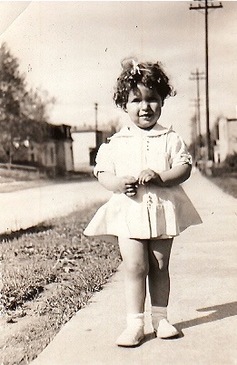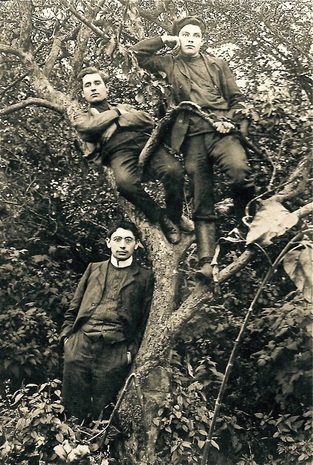
Forty years ago (forty-one, actually . . .) I turned forty, and it rocked.
We celebrated at a Donald-designed surprise party. My dearest friends were there, the youngest woman in her late thirties, the oldest guy just turned fifty, and each of us in great shape with narrow waists, straight backs and (depending on gender) perky boobs and washboard abs. Our vision sharp as birds of prey, hearing keen as bats, we were sure-footed as the Wallendas and limber as circus rubber men. We hopped in and out of low-slung sports cars with ease. Life was good.
Today, with empathy born of time, I tip my red hat to the young men and women featured on any list titled: The Most Influential People Aged Forty and Under. However old you are, I’ve been there. Which prompts me to say, “Chazak v’ematz." Be strong and of good courage, kids, because with mazel (and in a mere forty winks) you’ll be an octogenarian like me, quite possibly with the attendant cane, walker, ear trumpet, dentures, replaced knees, misplaced keys, chronic nostalgia, liver spots and the inability to get up from a chair without saying Oi.
For those badges of decrepitude, you can thank father Abraham. A midrash teaches that until Abraham, old folks had no distinguishing physical characteristics. Apparently our patriarch grew testy when people who saw him and his son Isaac together could’t tell which one was older, and thus failed to offer him (Abe) the honor and deference due the elderly. Unwilling to leave well enough alone, Abraham begged God to ‘crown’ him with signs of old age and ZAP, wrinkles and gray hair entered, laughing. Abraham’s wife, Sarah, ignored their arrival and remained (according to another midrash) youthful in appearance until the day she died at the age of 127, her skin still soft as a young girl’s and looking like a forty-year old woman.
There’s that number 40 again. The Torah and Talmud seem obsessed with it.
* Forty days and forty nights of Flood and waiting on Mt Sinai and Goliath bedeviling David before the lad beaned the giant with a stone.
* Forty years of wandering in the wilderness; of Eli judging; of Saul and Solomon ruling; and of Rabbi Zadok sitting in Jerusalem’s gates, fasting, eating only a few dried figs in his vain attempt to avert the destruction of the Temple.
* Jacob sent Easu a gift of forty cows.
* Forty spies searched out the land of Canaan.
* Forty measures of water fill a mikveh.
* At age forty, Isaac married Rebekah; Johanan ben Zakkai and Akiba began their rabbinic studies; and a man may plumb the Kabalah, perhaps to validate the Talmudic claim that the fortieth year is the age of understanding when we ascend from one level of discernment to the next higher one. By that reckoning my peers and I stand on the top-most rung, the sharpest pencils in the box, albeit with shaky handwriting.
Sure, I’d gladly reclaim the vigor of my youth. Being old, at times, is a colossal bummer. But according to Jewish text there is an upside. The sages wrote that insight, intellect and emotional strength comes with years. That at the age of eighty we are endowed with special strength. Granted, the sages weren’t spring chickens when they wrote those words and therefore biased and self-serving, but who cares. If special strength comes with eighty, I’ll take it. Advanced years certainly didn’t slow down the characters in the Passover story.
* Moses was eighty when God sent him to stand before Pharaoh and demand freedom for the Hebrew slaves.
* Aaron was eighty-three when he stood by his brother’s side and stood up to Pharaoh.
* Miriam was eighty-seven when she took timbrel in hand and danced with the women at the Red Sea.
* To lend weight to his argument with Pharoah, Moses was accompanied by the elders - the z’keinim - of Israel, possibly the same seventy elders who journeyed with him up Mt. Sinai and continued to act as wise counselors, advisors, judges and consultants to Moses and the Israelites during their forty year trek through the desert.
So. We’re back where we started, with #40 and its mystical place in Judaic text.
During forty years in the wilderness, Moses taught our ancestors the laws of Torah. At the end of those forty years, with their teacher Moses near death, the people were no longer students -- recipients of knowledge -- but teachers themselves, ready to pass down Jewish tradition to the next generation. After forty years the people had evolved from receivers to givers. Their role and responsibilities had changed. And that’s the message, sweet forty-and-unders. It’s your turn at bat. Perhaps the German philosopher Arthur Schopenhauer said it best. “The first forty years of life give us the text. The next thirty supply the commentary.” So here’s the mike. We elders wonder what you’re going to say. Whatever it is, please say it loud. Real loud.
As for me, I’m still ready to mix it up and offer my two cents when it seems appropriate (or appreciated). But for the most part I’ll take my cue from the wisdom of British author Fay Weldon (82) who writes, “When you’re in your eighties there are small triumphs, like getting the heels of your elastic stockings in the right place when you put them on.”
Ozzie Nogg ©2016
appeared originally in the Omaha Jewish Press
We celebrated at a Donald-designed surprise party. My dearest friends were there, the youngest woman in her late thirties, the oldest guy just turned fifty, and each of us in great shape with narrow waists, straight backs and (depending on gender) perky boobs and washboard abs. Our vision sharp as birds of prey, hearing keen as bats, we were sure-footed as the Wallendas and limber as circus rubber men. We hopped in and out of low-slung sports cars with ease. Life was good.
Today, with empathy born of time, I tip my red hat to the young men and women featured on any list titled: The Most Influential People Aged Forty and Under. However old you are, I’ve been there. Which prompts me to say, “Chazak v’ematz." Be strong and of good courage, kids, because with mazel (and in a mere forty winks) you’ll be an octogenarian like me, quite possibly with the attendant cane, walker, ear trumpet, dentures, replaced knees, misplaced keys, chronic nostalgia, liver spots and the inability to get up from a chair without saying Oi.
For those badges of decrepitude, you can thank father Abraham. A midrash teaches that until Abraham, old folks had no distinguishing physical characteristics. Apparently our patriarch grew testy when people who saw him and his son Isaac together could’t tell which one was older, and thus failed to offer him (Abe) the honor and deference due the elderly. Unwilling to leave well enough alone, Abraham begged God to ‘crown’ him with signs of old age and ZAP, wrinkles and gray hair entered, laughing. Abraham’s wife, Sarah, ignored their arrival and remained (according to another midrash) youthful in appearance until the day she died at the age of 127, her skin still soft as a young girl’s and looking like a forty-year old woman.
There’s that number 40 again. The Torah and Talmud seem obsessed with it.
* Forty days and forty nights of Flood and waiting on Mt Sinai and Goliath bedeviling David before the lad beaned the giant with a stone.
* Forty years of wandering in the wilderness; of Eli judging; of Saul and Solomon ruling; and of Rabbi Zadok sitting in Jerusalem’s gates, fasting, eating only a few dried figs in his vain attempt to avert the destruction of the Temple.
* Jacob sent Easu a gift of forty cows.
* Forty spies searched out the land of Canaan.
* Forty measures of water fill a mikveh.
* At age forty, Isaac married Rebekah; Johanan ben Zakkai and Akiba began their rabbinic studies; and a man may plumb the Kabalah, perhaps to validate the Talmudic claim that the fortieth year is the age of understanding when we ascend from one level of discernment to the next higher one. By that reckoning my peers and I stand on the top-most rung, the sharpest pencils in the box, albeit with shaky handwriting.
Sure, I’d gladly reclaim the vigor of my youth. Being old, at times, is a colossal bummer. But according to Jewish text there is an upside. The sages wrote that insight, intellect and emotional strength comes with years. That at the age of eighty we are endowed with special strength. Granted, the sages weren’t spring chickens when they wrote those words and therefore biased and self-serving, but who cares. If special strength comes with eighty, I’ll take it. Advanced years certainly didn’t slow down the characters in the Passover story.
* Moses was eighty when God sent him to stand before Pharaoh and demand freedom for the Hebrew slaves.
* Aaron was eighty-three when he stood by his brother’s side and stood up to Pharaoh.
* Miriam was eighty-seven when she took timbrel in hand and danced with the women at the Red Sea.
* To lend weight to his argument with Pharoah, Moses was accompanied by the elders - the z’keinim - of Israel, possibly the same seventy elders who journeyed with him up Mt. Sinai and continued to act as wise counselors, advisors, judges and consultants to Moses and the Israelites during their forty year trek through the desert.
So. We’re back where we started, with #40 and its mystical place in Judaic text.
During forty years in the wilderness, Moses taught our ancestors the laws of Torah. At the end of those forty years, with their teacher Moses near death, the people were no longer students -- recipients of knowledge -- but teachers themselves, ready to pass down Jewish tradition to the next generation. After forty years the people had evolved from receivers to givers. Their role and responsibilities had changed. And that’s the message, sweet forty-and-unders. It’s your turn at bat. Perhaps the German philosopher Arthur Schopenhauer said it best. “The first forty years of life give us the text. The next thirty supply the commentary.” So here’s the mike. We elders wonder what you’re going to say. Whatever it is, please say it loud. Real loud.
As for me, I’m still ready to mix it up and offer my two cents when it seems appropriate (or appreciated). But for the most part I’ll take my cue from the wisdom of British author Fay Weldon (82) who writes, “When you’re in your eighties there are small triumphs, like getting the heels of your elastic stockings in the right place when you put them on.”
Ozzie Nogg ©2016
appeared originally in the Omaha Jewish Press


 RSS Feed
RSS Feed
